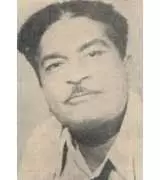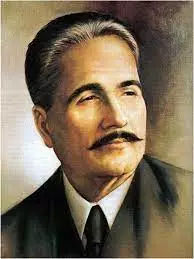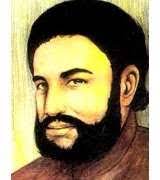Mohammed Dawood Khan ‘Akhtar Sheerani’ was born on 4th May, 1905, in Tonk state (Rajputana, now Rajasthan). He was a son of Hafiz Mehmood Khan Sheerani, a scholar and teacher of high repute. His father was teacher in Islamia College and afterwards professor at Oriental College, Lahore. Akhtar studied in the same college and did his Munshi Fazil in 1921 and Adeeb Fazil in 1922 but showed no special interest in academic achievements. Despite the efforts of his father, he could not continue his education and became a full time poet. His teacher in poetry (ustad) was ‘Maulana Tajwar Najibabadi’, a well-respected personality in literary circles of Lahore who used to publish literary magazines. By virtue of his literary and linguistic abilities, Akhtar could secure editorial assignments on several literary journals like ‘Humayun’ and ‘Shaahkaar’. He also wrote columns for dailies ‘Hamdard’ of Maulana Muhammad Ali Johar and ‘Zamindar’ of Maulana Zafar Ali Khan.
He also tried to run his own journals, ‘Baharastaan’ (1926-1927), ‘Khayalistan’, (1930-1932) and ‘Rumaan’ (1935-1939), but such attempts proved abortive as Akhtar lacked the steadiness of purpose and mind, so essential to carry such tasks to success.
Akhtar Shirani's life was a succession of tragedies. His young son Javed Mahmood died, his close friend Mirza Shuja Khan committed suicide, his son in law Naziruddin Shirani was accidentally drowned, and he failed in love with a woman, named Salma. All this led him to turn to alcohol and started excessive drinking.
Akhtar Sheerani died on September 9, 1948, at the comparatively young age of 43.
Aye Vaae Akhtar Huaa Ham Se Judaa Ab=1367 H
Lagaa Haaye Teer-E-Qazaa Kaa Nishaana=1948 AD
Shirani was the most popular poet of his generation. His famous romantic Nazms include 'Aye Ishq Kaheen Le Chal', 'Jahaan Rehana Rahti Thi' and ‘Salma’. He is referred to as “Shair-e-Romaan”, “Byron of Rajasthan”,”Adeeb-ul-Mulk” etc. Along with Majaz, he is also referred to as Keats of Urdu poetry.
Akhtar's poetry may be seen as a reaction against the overly didactic and ethical verse of ‘Hali’, ‘Akbar’ and ‘Iqbal’. All these poets carefully excluded from their poetry any mention of sensuous beauty or romance, and used it mainly as an instrument of social edification. Akhtar tried to reverse this trend by turning away from social and public issues, and by focusing his gaze on the inner world of feeling and imagination, highlighting in the process, the pivotal role of women in the theatre of human existence. He builds his poetry round the endearing figures of Salma, Azra, Rehana or Cleopatra, but creatures of imagination and models of womanhood.
In the matter of style, Akhtar adheres to the tradition of rhymed verse, along with "Radif" and "Qafia", and is not generally drawn by the new vogue for free verse or blank-verse. He is the master of the musical line and an adept in describing the beauties of the landscape. He has written several memorable poems on Barsaat or Basant, the two seasons specially adored by a wine-bibber.
Out of the three poems included in the volume "Aurat" dwells on the central role of woman in every sphere of human life, "Ai Ishq Hamen Barbad na Kar" is a plaintive song of a lovelorn lover, while the third poem, "Rehana", centres round a sweet little girl, breathing innocent charm, and dwelling in the lap of nature.
His poetical works include: “Naghma-e-Haram”, “Shairistaan”, “Subah-e-Bahar”, and “Tayyur-e-Aawara”.



